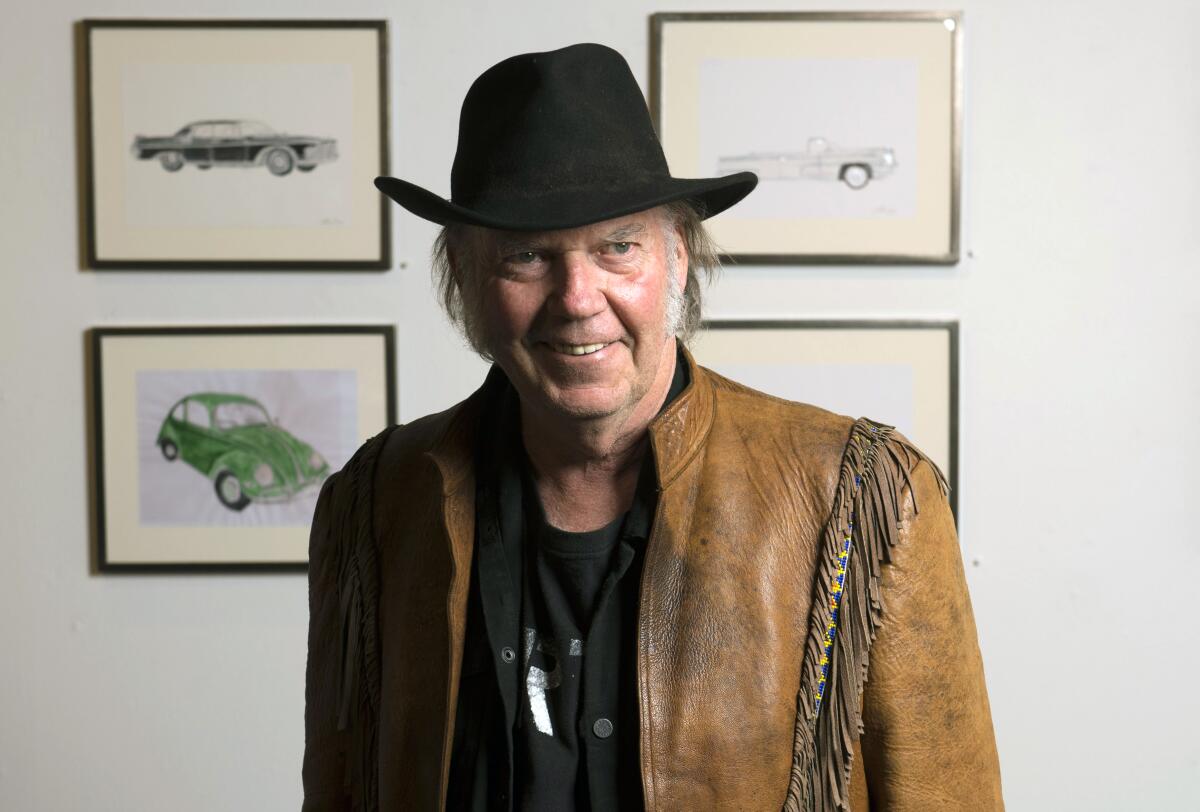Op-Ed: Neil Young can’t persuade Spotify to stop COVID misinformation

- Share via
Last week, Neil Young issued an ultimatum to Spotify after growing frustrated with podcast king Joe Rogan spreading COVID misinformation on the platform. “They can have Rogan or Young,” he declared. “Not both.”
Spotify chose Rogan; a firestorm ensued. Joni Mitchell and some other musicians ditched the service, while author Brené Brown paused her Spotify-exclusive podcast. Meghan Markle and Prince Harry, who have a big Spotify deal, voiced “concerns.” The company’s stock has shed billions in value over the past week, prompting founder Daniel Ek to respond Sunday by publishing a set of platform rules and promising to add content advisories.
But the message was clear: whether to defend free speech or secure profits, Spotify was standing by Rogan. And some are wondering whether the episode is about to set off a mass exodus of musicians, perhaps enough to endanger Spotify’s enviable position atop the streaming heap.
It won’t, and here’s why.
To begin, as admirable as it was for Young to put principles ahead of profits, he’s risking less than many of his peers would be. The “Heart of Gold” singer has never really needed Spotify, earning just 10% of his income from the service.
Young stood to gain even less from Spotify after selling half of his music catalog en route to a career-best $78 million in earnings last year (ranking him No. 11 on my list of the world’s highest-paid musicians). Merck Mercuriadis, the guy who bought Young’s copyrights, is standing by him. So is Warner Music Group, home to his records.
Most other musicians are still hurting from the lack of touring opportunities amid the pandemic — which, ironically, would almost certainly be over sooner without misinformation spread by the Rogans of the world. For those musicians, it’s hard to give up one of the few remaining sources of income. That’s especially true for the acts with younger followings, whom Spotify would be more stung by losing. Young’s audience of lefty Boomers is not a key demographic for the streaming business.
Spotify doesn’t need Young, but it does need Rogan. The company reportedly paid more than $100 million to bring him aboard; at the time, Rogan claimed he was clocking 190 million downloads a month. He’s the centerpiece of Spotify’s years-long push to become the Netflix of audio.
Unlike recorded music, which is encumbered by a byzantine morass of agreements among singers, songwriters, producers, record labels and copyright holders, podcasts are generally simpler and more profitable. In most cases, big names get a flat fee and that’s that — no pesky royalties to pay out, no renegotiations. The episodes can live on a platform in perpetuity and are quite popular with advertisers, generating $1 billion and counting in U.S. ad revenue annually.
Finally, and perhaps most critically, Spotify doesn’t want to slide down the slippery slope of booting Rogan and his ilk when there are so many others who are equally problematic. Like so many other major platforms (including Substack, where I write), the company defends its party line with a focus on protecting free speech. But the complexity and cost of moderating content can’t be overstated. To take responsibility for content would cut deeply into profits, probably driving many platforms out of business.
Musicians face a similar slippery slope. Upon leaving Spotify over COVID misinformation concerns, they’d have to confront another reality: The social networks that drive so much of their exposure are also havens for pandemic misinformation.
Is there a tipping point for Spotify, a critical mass of artists whose objections would make the company seriously consider dumping Rogan? Well, we might be having a different conversation if we were talking Drake and Taylor Swift — both of whom boast more than 50 million monthly listeners — instead of Young and Mitchell, who generate a fraction of the spins.
Perhaps even more disruptive would be an entire record label pulling its roster, a move that would endanger Spotify’s core proposition of offering a nearly unlimited buffet of music to subscribers.
But it’s very difficult to imagine either of those scenarios unfolding, because of the financial implications.
By far the most likely outcome: Spotify takes a hit in the short term but keeps its perch atop the streaming heap. For Young, the episode burnishes an already golden legacy of standing up for what’s right, no matter the cost.
Sounds right on brand for both.
Zack O’Malley Greenburg, author of the Jay-Z biography “Empire State of Mind” and formerly senior editor of media and entertainment at Forbes, writes about the business of music on Substack.
More to Read
A cure for the common opinion
Get thought-provoking perspectives with our weekly newsletter.
You may occasionally receive promotional content from the Los Angeles Times.










